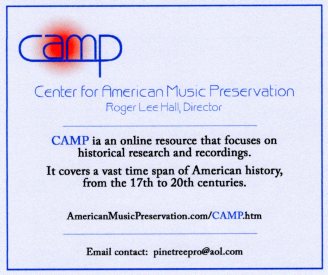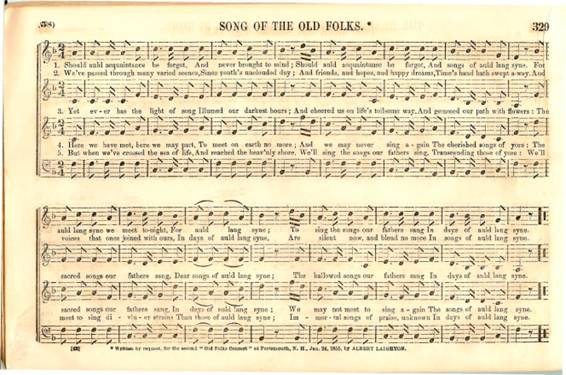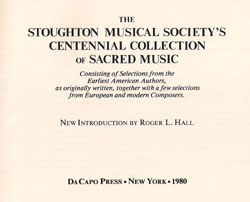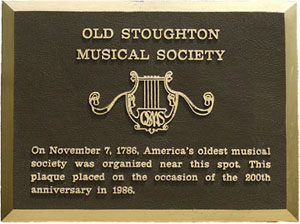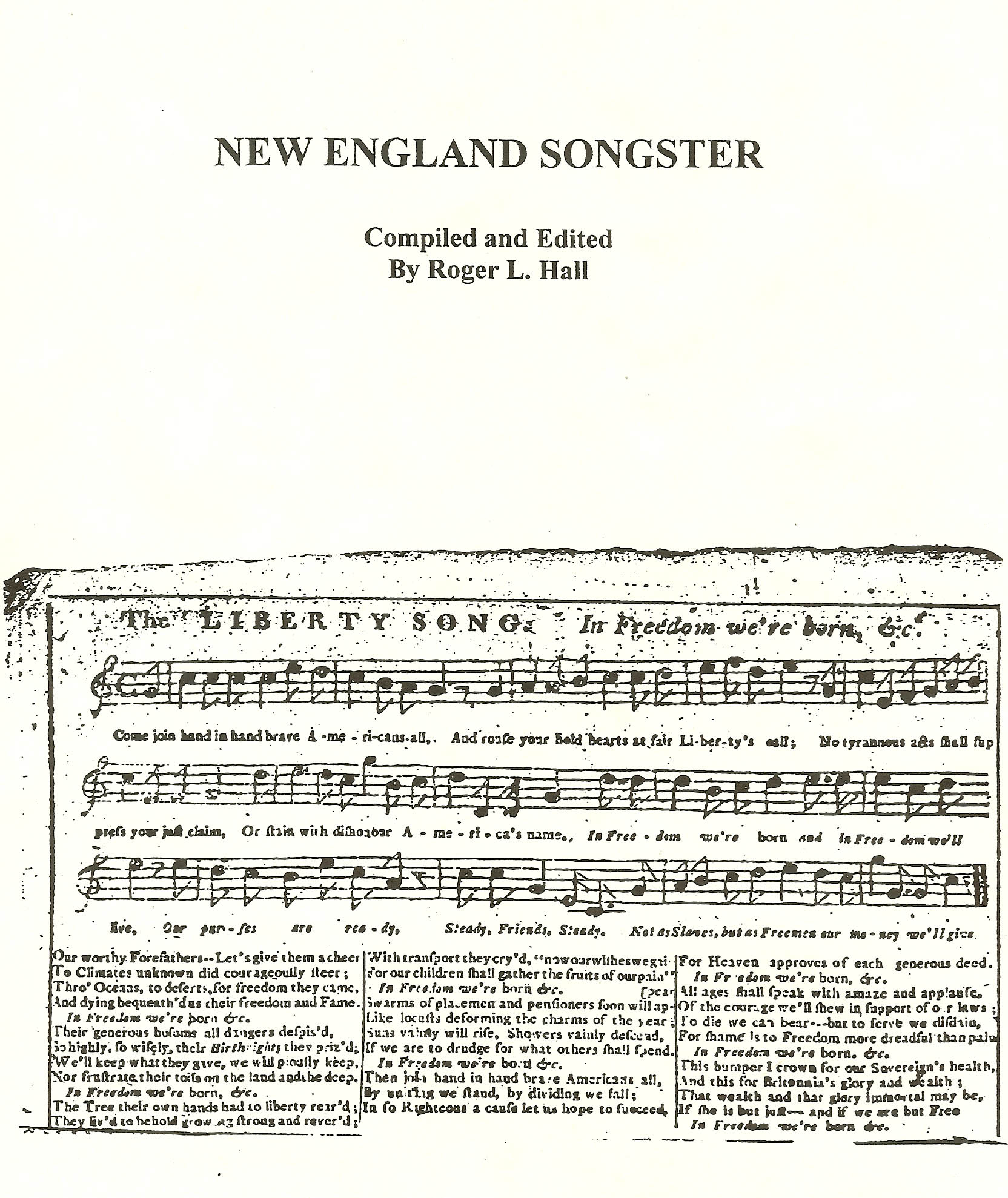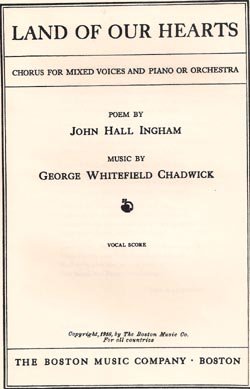
Father Kemp
and
The Old Folks Concerts
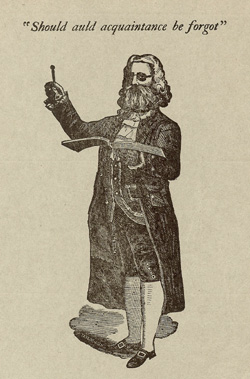
Who Was Father Kemp?
His full name was Robert C. Kemp and he was born in Wellfleet, Massachusetts on June 6, 1820 --some sources claim he was born in 1821.
By the time he reached the ago of twenty, he was a junior partner in a thriving shoe and boot business, Mansfield & Kemp at 261 Hanover Street in Boston. He also married a young lady, Elizabeth Jane Alden, who would become an important icon dressed in her fancy bonnet at the Old Folks Concerts.
After his marriage, Kemp purchased a twelve-acre farm in Reading, Massachusetts. There he planned to live out his years enjoying the rural life. One evening he invited some young people to join him in singing some of the old songs. In his autobiography of 1868, Kemp told it this way:
It occurred to me to revive old memories by singing some of the tunes which strengthened the religious faith of our grandfathers and grandmothers, and had often been the medium through which our sturdy and pious ancestors had lifted their hearts in thankfulness to their Maker, for planting their home in the land of liberty. Accordingly, the country round about was thoroughly scoured, and every old singing book which could be procured was brought to my house, on the next evening of the sing. An odd collection they were . . . prominent among them was the noted Billings and Holden collection, the others made up of singing books of more modern date which contained old tunes. These rehearsals attracted much attention in the neighborhood, and on the evenings set apart for them, the house was crowded with those who came to listen to the performances of the "old folks," as our neighbors familiarly called us.
The “old memories” he wrote about were the tunes from an earlier time.
Singing of "Auld Lang Syne"
During the 19th century, amateur singing groups were very popular in rural New England towns. The tradition goes back to the previous century when organizations such as the Old Stoughton Musical Society were meeting for regular “sings” in local homes or taverns frequented by men only. This musical society was organized as an all-male singing group on November 7, 1786. This society still exists today and is now the oldest choral society in the United States and also has the oldest constitution of any music organization, adopted in 1787, just a few weeks after the U.S. Constitution.
Over the years, the Old Stoughton Musical Society had the tradition of singing the Old Folks version of Auld Lang Syne in memory of those members who had died the previous year. That’s appropriate since the Scottish words of Auld Lang Syne translate roughly to: “for old times sake.”
Here is the music and version written by Albert Laighton:
SONG OF THE OLD FOLKS
(tune: AULD LANG SYNE)1. Should auld acquaintance be forgot,
And never brought to mind;
Should auld acquaintance be forgot,
And songs of auld lang syne.
For auld lang syne we meet tonight,
For auld lang syne;
To sing the songs our fathers sang
In days of auld lang syne.
2. We’ve passed through many varied scenes,
Since youth’s unclouded day:
And friends, and hopes, and happy dreams,
Time’s hand hath swept away.
And voices that once joined with ours,
In days of auld lang syne;
Are silent now, and blend no more
In songs of auld lang syne.3. Yet ever has the light of song
Illumed our darkest hours;
And cheer’d us on life’s toilsome way,
And gemm’d our path with flow’rs;
The sacred songs our fathers sang,
Dear songs of auld lang syne;
The hallowed songs our fathers sang
In days of auld lang syne.
4. Here we have met, but we may part,
To meet on earth no more;
And we may never sing again
The cherished songs of yore;
The sacred songs our fathers sang,
In days of auld lang syne;
We may not meet to sing again
The songs of auld lang syne.5. But when we’ve crossed the sea of life,
And reached the heav’nly shore,
We’ll sing the songs our fathers sing,
Transcending those of yore;
We’ll meet to sing diviner strains
Than those of auld lang syne;
Immortal songs of praise, unknown
In days of auld lang syne.--version by Albert Laighton
First sung in Portsmouth, New Hampshire in 1855
Read the extensive article about "An Early American Auld Lang Syne" -- here
Father Kemp’s Music Collection
The Old Stoughton chorus sang the "Auld Lang Syne" song from a reprint of the tune book titled, Father Kemp’s Old Folks Concert Tunes. This collection had been compiled by Robert Kemp and was published in three editions (1860, 1874 and 1889). The last of those editions was reprinted in 1917 and again in 1934, with Father Kemp’s original preface from 1860. In it he claims the following:
I have given over nine hundred concerts. One million of persons, at a very low estimate, have listened to the music of olden time as we have rendered it. Not a night but I am besieged with applicants for the old music – constant inquiries, where can I get this or that gem? – even offering exorbitant prices for the books in our hands.
In his autobiography, Kemp greatly expands on his 1860 statement and claims to “have swung my baton before a large choir in upwards of six thousand concerts.” If his claim is true, his concerts must have been hugely successful, perhaps reaching as many as six million people over the years!
Old Folks Concerts
Their first concert was given in Reading, Massachusetts. Following this initial success, they were invited to perform in Portsmouth, New Hampshire, where Albert Laighton’s version of Auld Lang Syne was sung for the first time on January 24, 1855. He had been asked to write new words for the Scottish folk tune [see the five verses above].
The following year the Old Folks group performed a series of eleven concerts in Boston, the first one held on March 13, 1856 at the famous Tremont Temple. At that time, there were only eleven musicians in the ensemble. That number quickly grew to forty-eight members in anticipation of a tour to major cities.
In New York, Father Kemp’s Old Folks performed before an audience of seven thousand. They were also invited to sing before U.S. President James Buchanan in Washington. D.C. Other stops on the tour were in Baltimore and Philadelphia.
By 1861, they were such a success that Father Kemp decided to take them to England. The Old Folks troupe gave forty concerts in London but Kemp decided this trip was not the big success he had expected. Upon their return, the singing troupe was reorganized and they made a successful tour of the American West.
By 1870, Kemp had grown tired of all the traveling so he left the Old Folks group and returned to his Boston shoe business. After his wife’s death, he went to live at the Old Men’s Home in Charlestown, Massachusetts.
Robert Kemp died in Boston on May 14, 1897.
He had been successful in two ventures: selling shoes and conducting music in the Old Folks Concerts.
Now, after over 150 years later, it is time to remember his achievements in publishing and performing vocal music from early America.
We should thank Robert Kemp for his dedication in preserving the
"music of the olden time" and all of it...for “auld lang syne."-- Roger Hall,
Director, Center for American Music Preservation (CAMP)
More about singing in Stoughton is available -- here
If you use any of the information from this article,
please give credit to the author and theCenter For American Music Preservation (CAMP)
Father Kemp’s Old Folks Concert Tunes
Compiled by Roger Hall
TUNES
Click on the links for listening samples:
America (1831) – words by Samuel Francis Smith, 1808-1895/
My Country 'Tis Of Thee - tune: “God Save the King”
Bethany (1859) – Lowell Mason, 1792-1872
Blue Hill (1800) – Daniel Belknap, 1771-1815
Boston (1778) – William Billings, 1746-1800
Bridgewater (1782) – Lewis Edson, 1748-1820
Buckfield (ca. 1805) – Abraham Maxim, 1773-1829
Cambridge – Dr. John Randall, 1715-1799
Celestial Watering (ca. 1805) – Jeremiah Ingalls, 1764-1828
Chester (1778) – words & music by William Billings and
new text by Phillip Doddridge, 1786 (OSMS singers)
China (1790) – Timothy Swan, 1758-1842
Complaint – Parmeter (dates unknown)
Confidence (1797) – Oliver Holden, 1765-1844
Coronation (1793) – Oliver Holden
David’s Lamentation (1778) – William Billings
Devotion (ca. 1785) – Daniel Read, 1757-1836
German Hymn – Ignaz J. Pleyel, 1757-1831
Greenwich (1786) – Daniel Read
Invitation (1784) – Jacob Kimball, 1761-1826
Lenox (1782) – Lewis Edson
Lisbon (1785) – Daniel Read
Majesty (1778) – William Billings
Mear (ca. 1720) – Aaron Williams, 1731-1776
Milford (1760) – Joseph Stephenson
Montague (1777) – Timothy Swan
Montgomery (1790) – Justin Morgan, 1747-1798
Mount Sion – Bartholomew Brown, 1772-1854
New Durham - Austin (dates unknown)
New Jerusalem (1796) – Jeremiah Ingalls, 1764-1828
Northfield (1800) – Jeremiah Ingalls
Ocean (ca. 1787) – Timothy Swan
Old Hundred (1551) – Louis Bourgeois
Plainfield (1800) – Jacob Kimball
Portland (ca. 1805) – Abraham Maxim
Rainbow (1785) – Timothy Swan
Russia (1786) – Daniel Read
Silver Street (ca. 1770) – Isaac Smith , fl. 1755-80
Sherburne (1785) – Daniel Read
St. Thomas (1770) – Aaron Williams
St. Martin’s (1735) – William Tans’ur
Turner (1816) – Abraham Maxim
Victory (1793) – Daniel Read
Windsor (1591) – George Kirbye
Worcester (1778) – Abraham MaximANTHEMS
Before Jehovah’s awful throne – Martin Madan, 1725-1790
Child of Mortality – John Bray, 1782-1822
Dying Christian – John Harwood
Easter Anthem (1787) – William Billings
I am weary – Unknown composer/ words based on Psalm 55:8
Jehovah's Praise (ca. 1870) - Edward L. White
Jerusalem, my glorious home– Lowell Mason, 1792-1872
Lord, dismiss us with thy blessing – Samuel Stanley
Ode on Science – Jezaniah Sumner, 1754-1836
Sons and Daughters of the Pilgrims (ca. 1870) - Temperance hymn
Sons of Zion – Johann Gottlieb Naumann
Sound the Loud Timbrel – Charles Avison
Strike the Cymbal – Vincent PucittaSECULAR & OTHER PIECES
Anvil Chorus – Giusseppe Verdi
Battle of Stonington – Unknown composer
Battle Cry of Freedom – George Root
Cousin Jedediah – H.S. Thompson
Dearest spot on earth is home – W.A. Wrighton
Glory, Hallelujah [Battle Hymn of the Republic] – words by Julia Ward Howe, 1862
Hail, Columbia – music: The President’s March/words by Joseph Hopkinson
Home again – M.S. Pike
John Brown – author unknown, 1861
Kidd’s Lament [Captain Kidd]– Folk ballad
Marseilles Hymn
My Grandma’s Advice – Folk song
Our flag is here – Unknown composer
Old Folks at Home (1851) – Stephen Foster, 1826-1864
The Last Rose of Summer – words by Thomas More
Revolutionary Tea – Folk song
Song of the Old Folks (Auld Lang Syne) – words by Albert Laighton, 1855
Star Spangled Banner – words by Francis Scott Key, 1814
Twas within a mile of Edinboro’ – Folk song
When George the Third was King – Folk song
Yankee’s return to Camp (Yankee Doodle) – Unknown composerTotal = 77 tunes
"Musick in Old Boston" - a concert celebrating the 350th anniversary
of the City of Boston in 1980, performed by soloists and the Old Stoughton Musical Society Chorus, Richard Hill, organist, Roger Hall, conductor.Read about this historic Jubilee 350 Concert -- click here
For more about New England music,
see these collections:
"DEDICATION":
A Guide to Singing Meetings and Concerts, 1762-1992
© 2020 PineTree Productions. All Rights Reserved for original content. Contact: pinetreepro@aol.com




